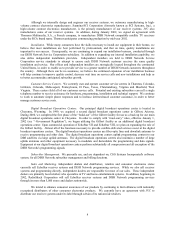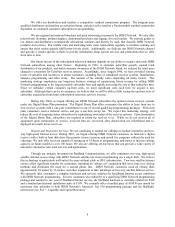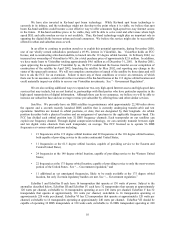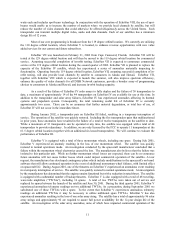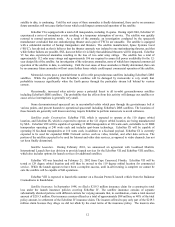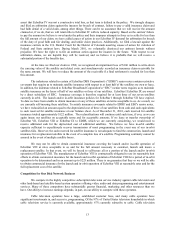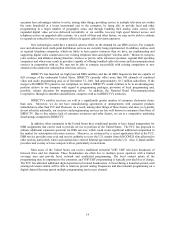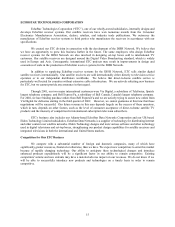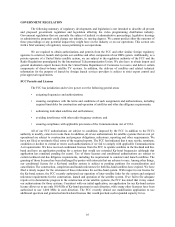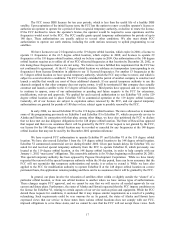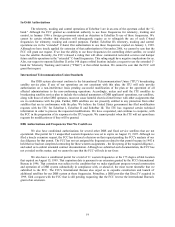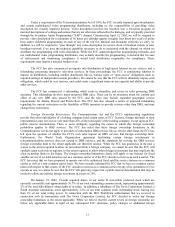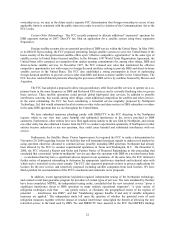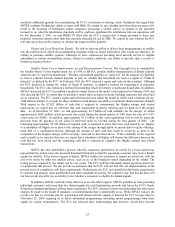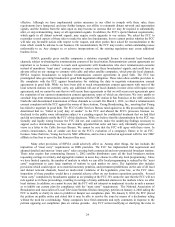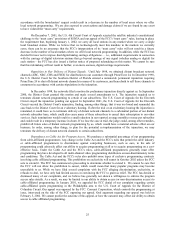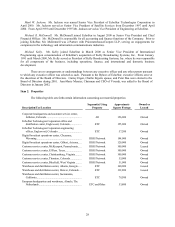Dish Network 2001 Annual Report Download - page 20
Download and view the complete annual report
Please find page 20 of the 2001 Dish Network annual report below. You can navigate through the pages in the report by either clicking on the pages listed below, or by using the keyword search tool below to find specific information within the annual report.18
actions would have a material adverse effect on our business. Moreover, because we cannot meet the geographic
service requirements from the 148 degree orbital location, we had to request and obtain a conditional waiver of these
requirements to allow operation of EchoStar I at that location. As a result, our current authorization to operate
EchoStar I at the 148 degree orbital location is subject to several conditions that may be onerous. Furthermore, we
have requested an extension of that waiver to also allow operation of EchoStar II at the same location, and we
cannot be sure the FCC will grant that request.
We have substantially completed the construction of one additional DBS satellite, EchoStar VIII. We
presently plan to operate this satellite at the 110 degree orbital location, but the launch and operation of this satellite
requires prior FCC approval. We have not yet applied for authorization to launch EchoStar VIII and we cannot be
sure that this request will be timely granted or that it will be granted at all by the FCC.
On February 25, 2000, we acquired Kelly Broadcasting Systems, Inc. We recently discovered that Kelly
Broadcasting Systems and us inadvertently failed to file with the FCC the necessary application to transfer control
over certain earth stations licensed to Kelly Broadcasting Systems. We have recently filed the necessary application
for a transfer of control over these earth stations, and have requested special temporary authority from the FCC to
continue to operate these earth stations while the application to transfer control is being processed by the FCC. We
cannot be sure that the FCC will not deny either or both of these requests or that it will not commence an
enforcement proceeding for the failure to file a timely transfer of control application, possibly resulting in fines or
revocation of the licenses in question. Any such action that might prevent Kelly Broadcasting Systems from
operating these earth stations would impair our ability to receive certain types of programming and deliver it to
customers.
Instead of constructing separate Ka-band and Ku-band satellites for which we have a license at the 121
degree orbital location, we are in the process of constructing a “hybrid” Ku/Ka-band satellite. Launch and operation
of this satellite requires prior FCC approval, which we have requested. We cannot be sure that this request will be
granted. That satellite does not currently incorporate inter-satellite links, and one company has argued to the FCC
that this makes us subject to more expedited milestones for our system, some of which have lapsed. We have
objected to this argument, but cannot be sure what action the FCC will take.
During November 2000, one of our subsidiaries purchased a 49.9% interest in VisionStar, Inc. VisionStar
holds an FCC license, and is constructing a Ka-band satellite, to launch into the 113 degree orbital location. In
February 2002, we increased our ownership of VisionStar to 90%, for a total purchase price of approximately
$2.8 million. In addition, we have made loans to VisionStar totaling approximately $4.6 million as of December 31,
2001. Pegasus Development Corporation filed a petition for reconsideration of the FCC’s approval of that
transaction. There can be no assurance that the FCC will not reconsider its approval or otherwise revoke
VisionStar’s license, rendering our investment worthless. Furthermore, VisionStar’s FCC license currently requires
construction of the satellite to be completed by April 30, 2002 and the satellite to be operational by May 31, 2002.
Failure to meet the milestones will make the license invalid unless the milestones are extended by the FCC. In May
2001, the FCC already denied an earlier request by VisionStar to extend its milestones. In October 2001, upon
granting the acquisition of VisionStar by us, the FCC conditioned the license transfer on our completion of
construction of the satellite by April 2002, launching the satellite by May 2002, and reporting any change in the
status of the spacecraft contract. We will not complete construction or launch of the satellite by those dates and will
have to ask the FCC for an extension. Failure to meet any of these conditions or receive an extension, of which
there can be no assurance, could result in the revocation of the Ka-band license at the 113 degree orbital location and
could materially impact our ability to recover our VisionStar investments.
Our projects to construct and launch additional Ku-band, extended Ku-band and Ka-band satellites are in
the early stages of development and are currently being challenged by several companies with interests adverse to
ours. There can be no assurance that the FCC will sustain these licenses, or grant the pending applications, or that
we will be able to successfully capitalize on any resulting business opportunities.
In general, many of our authorizations and pending applications are subject to petitions and oppositions
filed against us by several companies, and we cannot be sure that our authorizations will not be cancelled, revoked
or modified or that our applications will not be denied.


